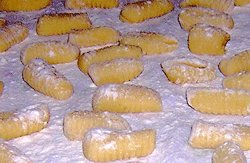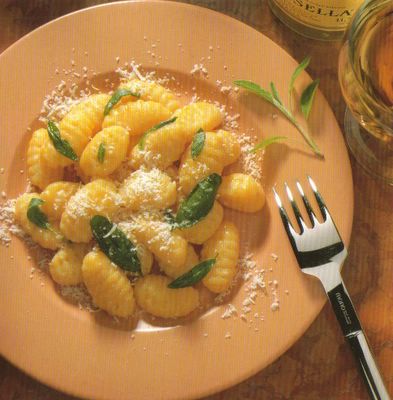Gnocchi
floury potatoes
The more floury the better. Washed, not peeled. The waxy sort just won't do. With 500 grams you can make gnocchi for 4 people as a starter or for 2-3 as a main dish.
all purpose flour
The amount varies every time.
eggs
One every 500 grams of potatoes.
This is optional but helps getting a dough that's easier to work with and, according to some, does not fall apart when cooked.
These are the classic ingredients.
One could add herbs, spices, cocoa powder, pumpkin (you'll need more flour in this case), chestnuts (just to name a few) to get flavoured gnocchi.
Herbs and pumpkin ones are traditional.
What absolutely does not come in the gnocchi is salt. Salt is hygroscopic, i.e. absorbs water, and could make the gnocchi fall apart.
Apart from a working surface, pot, slotted spoon, you'll need a ricer.
The ricer is in my experience the best way to mash the potatoes for gnocchi so to preserve their fluffiness.
I've tried other methods too. Food processor gives really gummy gnocchi, a potato masher is OK but you have too look out for eventual lumps.
So the first step is to boil the potatoes till done.
A bit overcooked is better than undercooked but try to get them out as soon as they're done.
While still hot peel the potatoes and press them through the ricer.
Wait till slightly cooler and add the beaten egg(s) and mix, adding flour from time to time till you have a soft but not sticky dough. The flour amount varies with potato sort, weather and so on: most of the times I have to add about 200 grams.
Once the dough is finished, take a piece as big as a small orange and shape it into a stubby cylinder.
Lay it on a floured surface and using both hands roll it till you get a uniform 1-1.5 cm thick dough "rope".
Cut into square pieces. The pieces are already gnocchi but to make the sauce you'll be serving with them stick better you should make them ribbed using a gnocchi board or a fork. You put a piece of dough at one end of the board and, rolling it with your thumb, push it to the other end. I prefer the gnocchi board because I'm not really good at doing it with a fork but both work fine.
Dust the finished gnocchi with a bit of flour and let them rest while you shape the rest of the dough.
Gnocchi can be cooked straight away but can rest for some time (I never tried longer than 2 hours).
To cook them throw them in a pot full of salted water (lots of salt! the gnocchi don't have any, remember?) at a gentle boil and strain them as soon as they come to the surface with a slotted spoon.
You should avoid overcrowding your pot so you might have to cook them in batches.
Just add a little of the sauce of your choice to the cooked ones to prevent them sticking to each other.
Traditional sauces for gnocchi are: burro e salvia (sage butter), simple tomato sauce with basil, cheese sauces (for example gorgonzola sauce: lots of gorgonzola melted in a little milk), sometimes also meat sauces (hare ragout and similar).
They're also great with tomato sauce, scamorza cubes and a sprinkling of parmisan then baked till the gnocchi on the top turn brown and slightly crunchy (gnocchi alla Sorrentina).
------------------
Il Forno: My tiny culinary institute: gnocchi
The more floury the better. Washed, not peeled. The waxy sort just won't do. With 500 grams you can make gnocchi for 4 people as a starter or for 2-3 as a main dish.
all purpose flour
The amount varies every time.
eggs
One every 500 grams of potatoes.
This is optional but helps getting a dough that's easier to work with and, according to some, does not fall apart when cooked.
These are the classic ingredients.
One could add herbs, spices, cocoa powder, pumpkin (you'll need more flour in this case), chestnuts (just to name a few) to get flavoured gnocchi.
Herbs and pumpkin ones are traditional.
What absolutely does not come in the gnocchi is salt. Salt is hygroscopic, i.e. absorbs water, and could make the gnocchi fall apart.
Apart from a working surface, pot, slotted spoon, you'll need a ricer.
The ricer is in my experience the best way to mash the potatoes for gnocchi so to preserve their fluffiness.
I've tried other methods too. Food processor gives really gummy gnocchi, a potato masher is OK but you have too look out for eventual lumps.
So the first step is to boil the potatoes till done.
A bit overcooked is better than undercooked but try to get them out as soon as they're done.
While still hot peel the potatoes and press them through the ricer.
Wait till slightly cooler and add the beaten egg(s) and mix, adding flour from time to time till you have a soft but not sticky dough. The flour amount varies with potato sort, weather and so on: most of the times I have to add about 200 grams.
Once the dough is finished, take a piece as big as a small orange and shape it into a stubby cylinder.
Lay it on a floured surface and using both hands roll it till you get a uniform 1-1.5 cm thick dough "rope".
Cut into square pieces. The pieces are already gnocchi but to make the sauce you'll be serving with them stick better you should make them ribbed using a gnocchi board or a fork. You put a piece of dough at one end of the board and, rolling it with your thumb, push it to the other end. I prefer the gnocchi board because I'm not really good at doing it with a fork but both work fine.

Dust the finished gnocchi with a bit of flour and let them rest while you shape the rest of the dough.
Gnocchi can be cooked straight away but can rest for some time (I never tried longer than 2 hours).
To cook them throw them in a pot full of salted water (lots of salt! the gnocchi don't have any, remember?) at a gentle boil and strain them as soon as they come to the surface with a slotted spoon.
You should avoid overcrowding your pot so you might have to cook them in batches.
Just add a little of the sauce of your choice to the cooked ones to prevent them sticking to each other.

Traditional sauces for gnocchi are: burro e salvia (sage butter), simple tomato sauce with basil, cheese sauces (for example gorgonzola sauce: lots of gorgonzola melted in a little milk), sometimes also meat sauces (hare ragout and similar).

They're also great with tomato sauce, scamorza cubes and a sprinkling of parmisan then baked till the gnocchi on the top turn brown and slightly crunchy (gnocchi alla Sorrentina).
------------------
Il Forno: My tiny culinary institute: gnocchi







0 Comments:
Post a Comment
<< Home ::